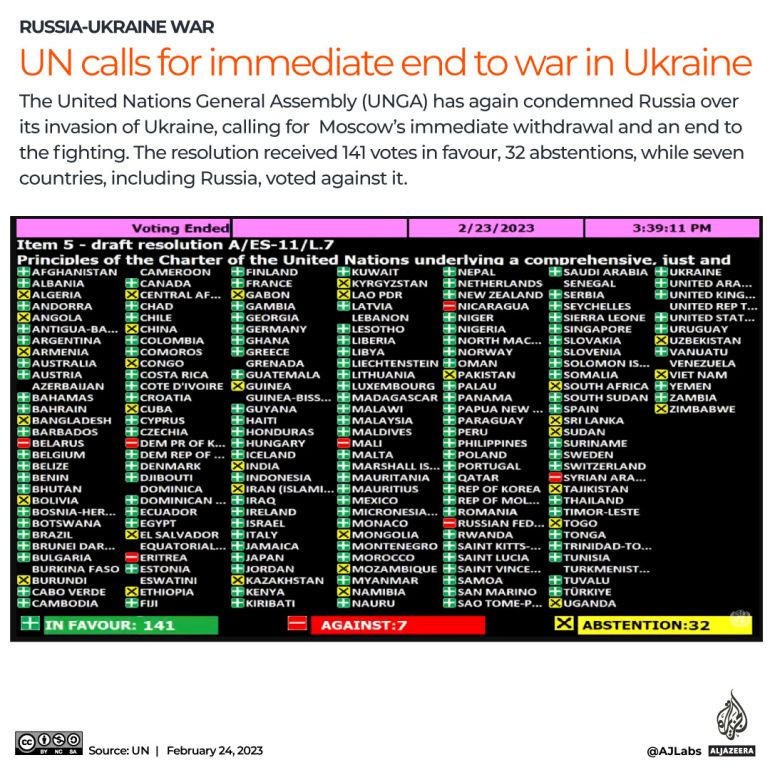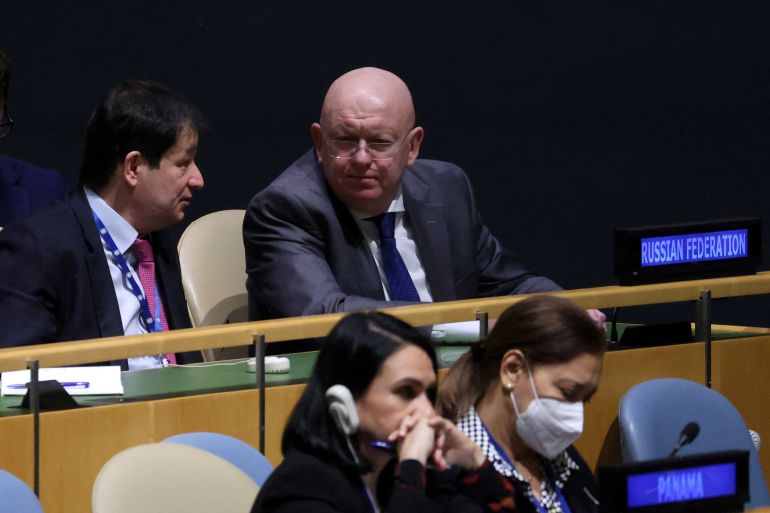A country breakdown of the UN General Assembly vote that demanded Moscow withdraw its troops and end the fighting.
The United Nations General Assembly (UNGA) has again condemned Russia over its invasion of Ukraine, calling for Moscow’s immediate withdrawal and an end to the fighting.
A year since President Vladimir Putin ordered the invasion, which he has called a “special military operation”, 141 countries backed the resolution calling for a “comprehensive, just and lasting peace” in Ukraine. Thirty-two countries abstained from voting, while seven countries, including Russia, voted against.
Here is a breakdown of how each country voted in the UNGA in New York City on Thursday:

For (141):
A: Afghanistan, Albania, Andorra, Antigua and Barbuda, Argentina, Australia, Austria
B: Bahamas, Bahrain, Barbados, Belgium, Belize, Benin, Bhutan, Bosnia and Herzegovina, Botswana, Brazil, Brunei, Bulgaria
C: Cabo Verde, Cambodia, Canada, Chad, Chile, Colombia, Comoros, Costa Rica, Cote d’Ivoire, Croatia, Cyprus, Czechia
D: Democratic Republic of the Congo, Denmark, Djibouti, Dominican Republic
E: Ecuador, Egypt, Estonia
F: Fiji, Finland, France
G: The Gambia, Georgia, Germany, Ghana, Greece, Guatemala, Guyana
H: Haiti, Honduras, Hungary
I: Iceland, Indonesia, Iraq, Ireland, Israel, Italy
J: Jamaica, Japan, Jordan
K: Kenya, Kiribati, Kuwait
L: Latvia, Lesotho, Liberia, Libya, Liechtenstein, Lithuania, Luxembourg
M: Madagascar, Malawi, Malaysia, Maldives, Malta, Marshall Islands, Mauritania, Mauritius, Mexico, Micronesia, Monaco, Montenegro, Morocco, Myanmar
N: Nauru, Nepal, Netherlands, New Zealand, Niger, Nigeria, North Macedonia, Norway
O: Oman
P: Palau, Panama, Papua New Guinea, Paraguay, Peru, Philippines, Poland, Portugal
Q: Qatar
R: Republic of Korea (South Korea), Republic of Moldova, Romania, Rwanda
S: Saint Kitts and Nevis, Saint Lucia, Saint Vincent and the Grenadines, Samoa, San Marino, Sao Tome, Saudi Arabia, Serbia, Seychelles, Sierra Leone, Singapore, Slovakia, Slovenia, Solomon Islands, Somalia, South Sudan, Spain, Suriname, Sweden, Switzerland
T: Thailand, East Timor, Tonga, Trinidad and Tobago, Tunisia, Tuvalu, Turkey
U: Ukraine, United Arab Emirates, United Kingdom, United States, Uruguay
V: Vanuatu
Y: Yemen
Z: Zambia
Against (7):
B: Belarus
D: Democratic People’s Republic of Korea (North Korea)
E: Eritrea
M: Mali
N: Nicaragua
R: Russia
S: Syria

Abstained (32):
A: Algeria, Angola, Armenia
B: Bangladesh, Bolivia, Burundi
C: Central African Republic, China, Republic of Congo, Cuba
E: El Salvador, Ethiopia
G: Gabon, Guinea
I: India, Iran
K: Kazakhstan, Kyrgyzstan
L: Laos
M: Mongolia, Mozambique
N: Namibia
P: Pakistan
S: South Africa, Sri Lanka, Sudan
T: Tajikistan, Togo
U: Uganda, Uzbekistan
V: Vietnam
Z: Zimbabwe



.jpg)



